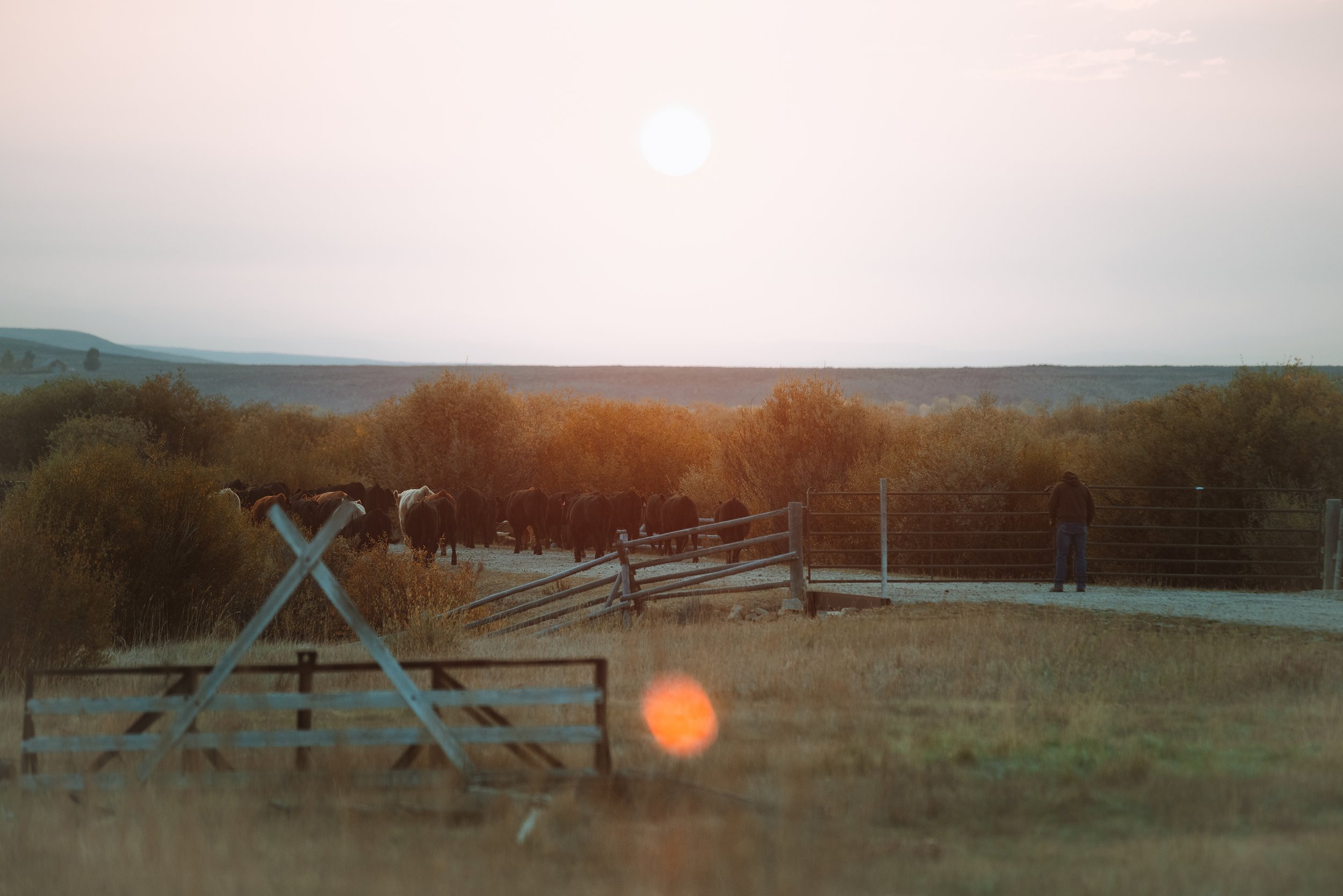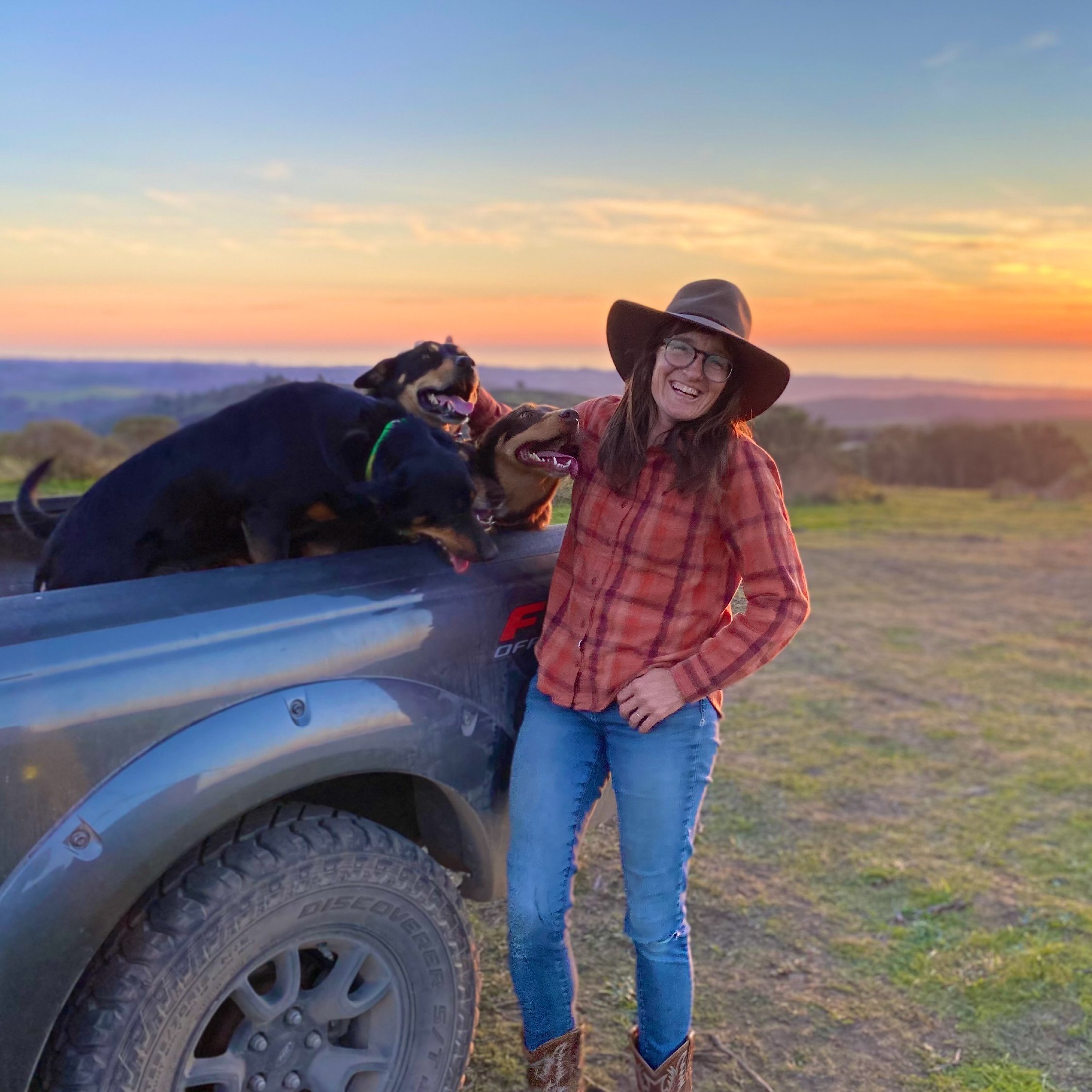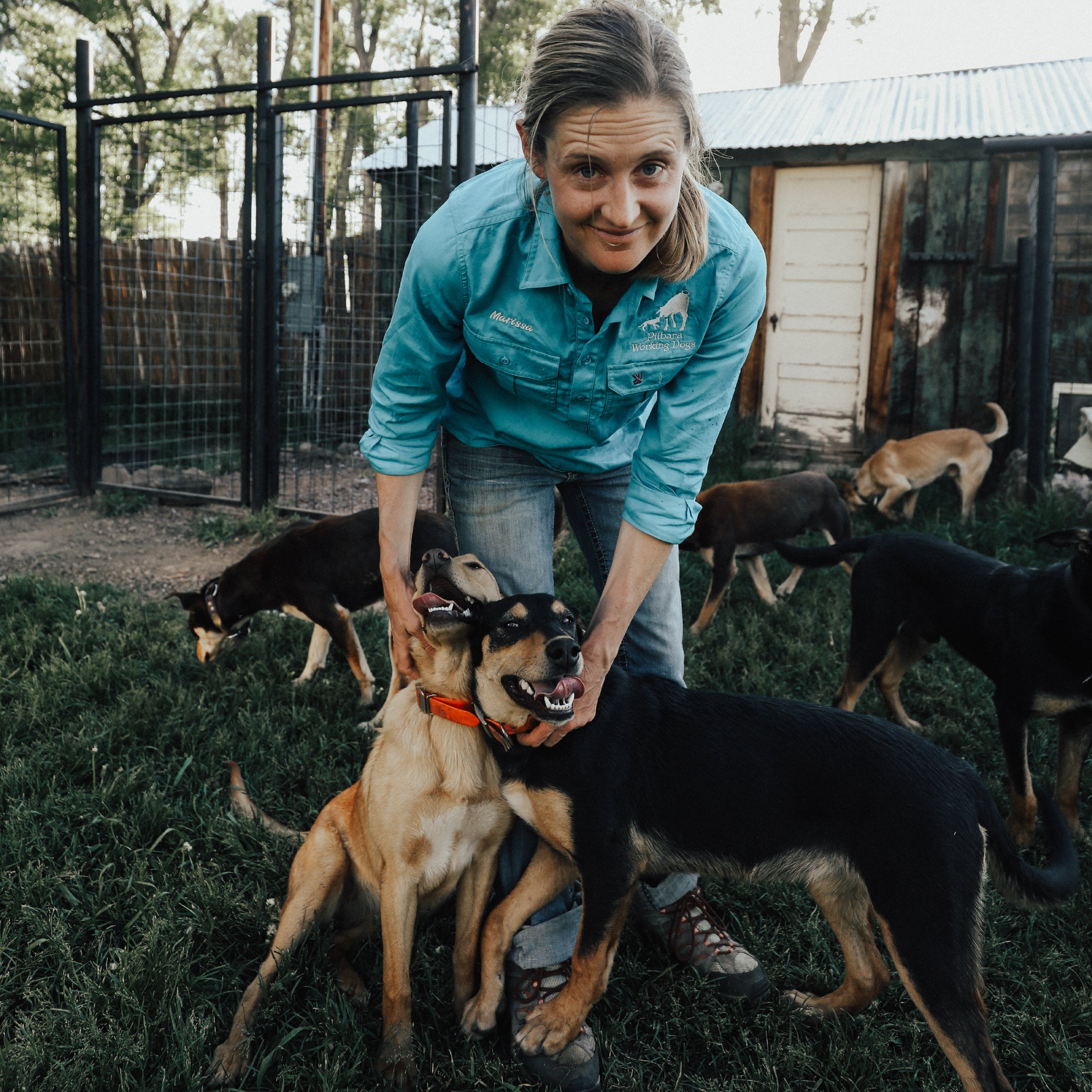
MENTORSHIP MATTERS
In 2023, Marissa Taylor and Stephanie Pittman co-facilitated a stockhandling workshop held by Women in Ranching and hosted at the TomKat Ranch. The event is a culmination of shared learning, support and persistence.The two women met for the first time at a Women in Ranching Circle gathering in 2018 and again at a stockmanship and working dog clinic, both events hosted by TomKat Ranch. Soon after, when Stephanie was looking for a dog to join her team, she called Marissa, who connected her with her first kelpie, Kassie.
Since then, Marissa and Stephanie have remained in contact, sharing stockhandling and stock dogs experiences. Neither of them considers their relationship to be as straightforward as mentor-to-mentee. Still, Marissa has passed on the support and guidance that was afforded to her by the people who introduced her to working dogs and proper stockmanship.
“Mentorship is not just about knowledge, expertise, and guidance but about that sense of community that helps you stay resilient from day to day,” says Stephanie. “You are able to uphold your principles and know that you have backup and support. Being mentored by Marissa has not just been a game changer, but a life changer.”
Marissa grew up around cattle and horses but wasn’t introduced to the concept of stockmanship until 2009 when she was living abroad in Australia. “While driving, I came across a man on a motorcycle who was moving cattle with a lot of dogs,” she says. “The dogs were working very far away from their handler, but everyone, dogs, cattle, and rider, all seemed to be on the same page. I was fascinated to learn more”.
Marissa had always had an interest in dogs, so she did some research and reached out to various resources, hoping to learn more about the human-dog-cattle relationship she had witnessed. One couple responded to her inquiry and invited her to visit their ranch and learn about their working dogs, which began her journey with stockmanship. It quickly became apparent that it was more than a skillset; this was a philosophy to work by. “They taught me very little about dogs and focused mainly on proper stockmanship,” says Marissa.
Marissa returned to the States in 2011 with kelpie dogs in tow and tried to implement some of the concepts she’d learned. “None of what had been working in Australia was working at home,” she says. “I called up the couple that had been mentoring me, and they came to the States to help train my cattle and the rest of our team. They came back four or five years in a row to help get everyone on the same page communicating with our livestock. The continued support made all the difference.”
She and her husband now run the family’s calf-cow operation. Using the skills taught by their Australian mentors and with essential help from their pack of kelpies, we can handle the livestock work independently. They have two children, who are still too young to know if they are interested in working the ranch, but Marissa says they’ve picked up a lot just from being around the animals. Marissa says. “My eight-year-old has bonded with one of my dogs—she loves the connection with the animals, and that’s the most important thing.”
Stephanie Pittman is originally from Memphis, TN, and began working in the agriculture industry in her twenties. She started her journey working with ruminants on a couple hundred acres and became interested in grassland ecology and rangelands. At the time, she was living in New York and working for a nonprofit and started looking for places out West to pursue this new interest.
“It was really hard to find an ‘in,’ Stephanie says. “I didn’t grow up riding horseback; the most experience I’d had was bareback on draft horses.” Finally, Stephanie found someone looking for help with lambing season, and she took a four-month lambing gig at the Paicines Ranch in California. “I ended up staying for four years,” says Stephanie.
November 15th, 2023





This job was the first time Stephanie had been exposed to any kind of stockmanship education. “Stockmanship didn’t exist in the spaces I’d been previously working in,” she says. “We were handling stock, but we moved the animals by chumming them with grain or partially chasing them. Reading stock and understanding their normal frame of mind, playing to their prey instincts, etcetera, wasn’t talked about, and I wasn’t aware that those practices existed.”
After attending the stockmanship and stock dog clinic co-facilitated by Marissa, Stephanie became interested in getting a working dog of her own. “The clinic was revelatory to me,” says Stephanie. “They ran and worked dogs in a different way than I’d ever seen. Marissa helped me source my first dog, and we’ve been in touch ever since. I’ve probably only seen her in person around five times in five years, but we connect through phone calls and texts; sometimes, she will even send me drawings to help me visualize positions and movement.”
There have been times that Stephanie has called Marissa and explained a scenario she could use advice on. “One time I called and told her I needed to herd a couple hundred sheep four miles down a mountain and that I have one dog, and she helped me work through it,” she says. “Talking through it ahead of time with Marissa has helped me ground myself. We will also sometimes debrief afterward—talk about the plan, what actually happened, and what I would do differently next time. A year later I was working a couple dogs on a couple thousand sheep. Mentorship accelerated my capacity for good work. I'm only here because folks took the time to create a safe space for me to fall on my face–to brainstorm, experiment, and problem-solve. It’s almost alarming how impactful it is just to be given that space.”
This relationship with Stephanie has also helped Marissa grow her understanding of stockmanship by teaching. “When you teach something, you learn it again,” says Marissa. “I question my own understanding and wrestle with the concept to make sure I understand it and am communicating accurately.”
“I feel safe teaching Stephanie,” says Marissa. “We have a connection and a shared respect, which I think is key to a healthy relationship. I don’t consider myself an expert, and I don’t always know the answer.”
Recently, Stephanie hired two women as shepherds to help her with her work on the ranch and has taken on a mentoring role herself. She says she hesitated to step into what she considers a leadership role for a long time because it felt intimidating. One thing she has learned from Marissa is that it’s okay to say, “This is where I’m at in my learning right now,” and that it’s okay not always to have the answer.
“Just as much as I lead or teach or train, I think mentorship is a two-way street,” she says. “I’m constantly learning from watching these two shepherds, and I’ve only been able to achieve what I have so far because of Marissa and my sheep mentor at Paicines; it’s been a really fun journey.”
“Mentorship is not just about knowledge, expertise, and guidance but about that sense of community that helps you stay resilient from day to day,” says Stephanie. “You are able to uphold your principles and know that you have backup and support. Being mentored by Marissa has not just been a game changer, but a life changer.”
Marissa Taylor is the Business Manager at her family's ranch in Wyoming and co-owner of Northway Ranch Services. At the ranch, the journey to understand proper stockmanship started with the desire to make the corrals fun and safe for the whole family. The path has led them to develop incredible human friendships and has impacted ranch economics. Marissa holds a Master of Business Administration degree with studies focused on agricultural sustainability. She serves her community and industry in several capacities, including the Governor of Wyoming’s Migration Corridor Task Force, and is a board member for Western Landowners Alliance and Wyoming Stock Growers Land Trust.
Stephanie Pittman is currently the Small Ruminant Coordinator at TomKat Ranch. For the past decade, she has raised livestock at for-profit ranches and educational nonprofits across the country. Her team at TomKat manages a herd of Spanish cashmere goats for increased biodiversity, soil health, wildlife habitat, and wildfire mitigation. As a shepherd, Stephanie strives to contribute an example of how thrifty, adaptive ruminants can transform landscapes and bolster climate resiliency.
